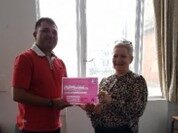Bhabha’s ‘third space’ concept (1990) is a postcolonial theory that Gill Ryan and Gabi Witthaus have previously explored in this blog. In the scenario of the pilot, the ‘first space’ can be imagined as the classroom, in this case a synchronous online space situated in the dominant culture, and the ‘second space’ where forced migrants exist in their own culture, such as their home or community. The learner support provided by the partner organisations created a ‘hybrid’ third space where neither culture is dominant.
Between sessions taught by Open University tutors, the partner organisations provided this ‘third space’ where learners felt comfortable talking to each other and the staff or volunteer involved. They could discuss their understanding of the taught content, what they were struggling with and what support they may need. For some learners, raising these questions with tutors may be difficult due to cultural differences in learning and teaching (Sundaresan, 2020).
Both organisations felt it was important to ensure a staff member or volunteer attended at least one of the two weekly taught sessions. This enabled them to be a “visible presence” but also to familiarise themselves with the content for discussion with learners afterwards. Prior to the start of the pilot, the APSS team in the OU in Scotland had run a workshop[1] for the staff and volunteers involved so they would be familiar with the OpenLearn content we used in the programme and could be confident supporting learners to navigate it.
Contrasting approaches
Bridges Programmes assigned two staff members who took it in turns to attend tutor-led sessions so there would always be a Bridges representative visibly present. They supported their learners through the provision of online drop-in sessions and followed up with those who fell behind. Learners knew support was available if they had problems, such as not being able to access content, having IT issues or needing guidance on their next steps.
The ethos of Bridges is to support clients to push themselves and to be realistic about setting goals they can achieve. As learners needed to be prepared for independent study, Bridges didn’t chase people who they felt weren’t motivated. In hindsight, they reflected “we maybe should have been a wee bit better at follow up and chivvying people”.
The Scottish Refugee Council (SRC) assigned a volunteer who also attended at least one of the tutor-led sessions each week to provide a visible presence. They took a more structured approach, providing weekly group sessions online and offering intensive 1:1 support where learners needed it.
The volunteer also built relationships with both tutors and maintained communication with them, making them aware of learners who may be struggling. She also provided feedback which the tutors could use to tailor their sessions more effectively.
Learner outcomes
Although the nature of the support offered in this space differed between the partner organisations, there was no difference in the impact on completion rates (50%) for each cohort. Learner feedback suggests they appreciated the support provided from the relevant partner. In the survey responses, more than half of learners rated this support as ‘most helpful’. We developed two case studies, with one learner from each organisation, and both felt the support they had was valuable.
Both partner organisations felt it was important to attend tutor-led sessions to provide a ‘visible presence’ for learners. It may be the impact of the third space was related to the fact that learners were aware it was there if they needed it rather than the nature of the support.
[1] This workshop was developed as part of our Open Learning Champions project.
Bali, M. and Zamora, M. (2022). The Equity-Care Matrix: Theory and Practice. Italian Journal of Educational Technology. doi.org/10.17471/2499-4324/1241 (accessed 23 April 2023).
Bhabha, H. (1990). The Third Space. In J. Rutherford (Ed.). Identity: Community, Culture, Difference (pp. 207–221). Dagenham, UK: Lawrence & Wishart Ltd.
Open University in Scotland (2022). The Open Learning Champions Project Evaluation 2016-2021. Online: https://www.open.ac.uk/scotland/sites/www.open.ac.uk.scotland/files/files/OLC%20Champions%20report%20FINAL%20May%202022.pdf (accessed 17 May 2023).
Sundaresan, J. (2020) ‘Decolonial reflections on urban pedagogy in India’, Area, 52(4), pp. 722–730.

